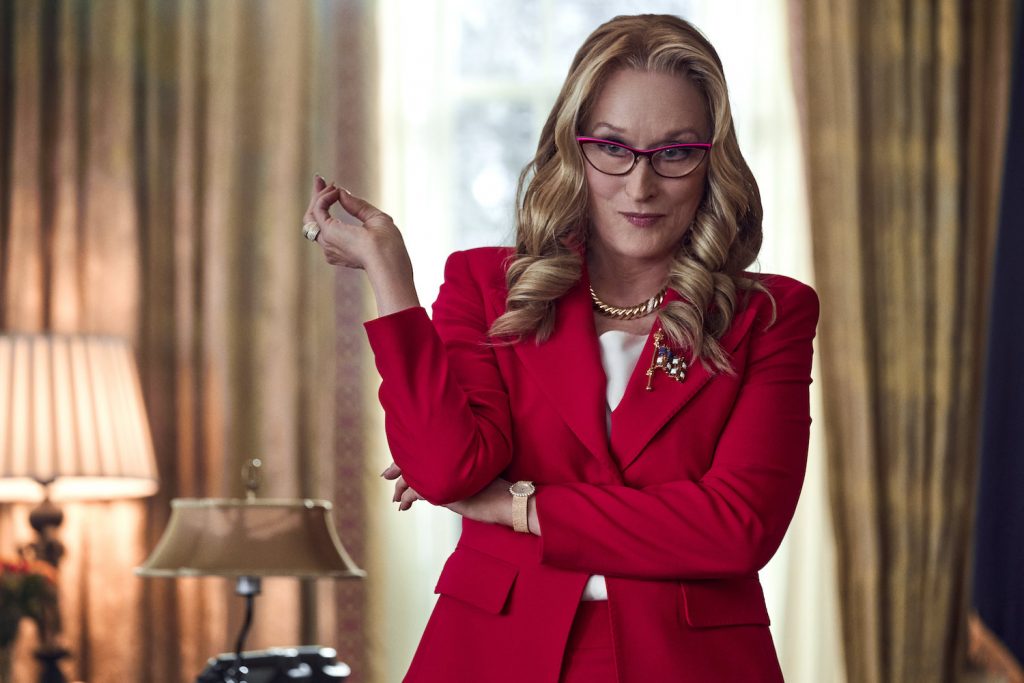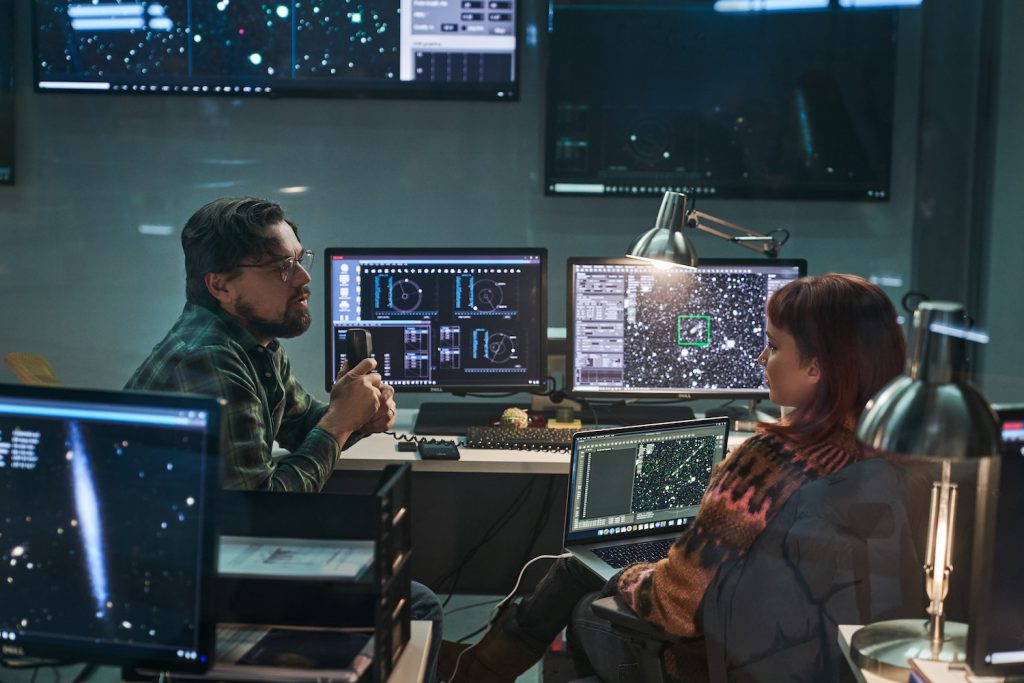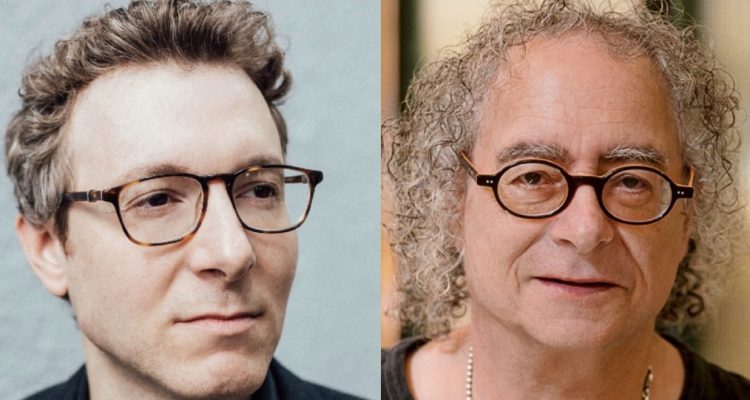Adam McKay’s new Netflix film Don’t Look Up marks the third collaboration between two Academy Award nominated artists; composer Nicholas Britell, and editor Hank Corwin.
Their first and second collaborations were in McKay’s 2015 scathing account of the financial crisis in The Big Short, and next his 2018 feature on the political life of Dick Cheney in Vice. Together they mark Don’t Look Up as their greatest challenge yet.
The film follows an astrology student (Jennifer Lawrence) and her professor (Leonardo diCaprio) who make a discovery of a comet orbiting the solar system, and it’s on a direct collision course with Earth. With only six months until the comet makes impact, they must convince the world to just look up. Britell’s intentionally grandeur score plays into the absurdity of the comedy, while Corwin’s editing cuts into scenes to create a more bombastic flow to the proceedings.
“What we discovered, much to mine and Nicholas’s dismay, was that the tone of the movie was devilishly hard to ascertain,” Corwin shares. “This, for me, was the most challenging movie I’ve ever worked on.”
Britell and Corwin spoke with Awards Focus about finding a balance in tone for the film, developing a concert piece with Ariana Grande, and highlighting the seriousness of the film with absurd music choices.
Awards Focus: The film has been very well received. Can you talk a bit about the labor of love in getting the project to the screen?
Nicholas Britell: I remember reading the script years ago, pre-covid, thinking about the possibilities for it. There was so much work that went into it before the film was shot. Hank and I are always in touch about these projects, at any stage of the production.
I wrote a piece for them to play on set called The Overture of Logic and Knowledge that was supposed to summon that feeling of the veneration of knowledge. What humankind can aspire to, and what is the opposite of that feeling is the other part of the movie. The film is so tonally complex, it’s a huge, breakneck speed comedy dealing with these incredibly profound issues. Hank, Adam (McKay) and I are in constant dialogue because so much of the process is the three of us.
Hank Corwin: The piece that Nicholas wrote was just exquisite. The way he and I work, even before we start anything with Adam, is we’ll look at a daily and put a piece of music up against it, and try to ascertain the colors of the film. This piece was beautiful but was also a launching place to start, and we could go antithetically to it.
What we discovered much to mine and Nicholas’ dismay was that the tone of the movie was devilishly hard to ascertain. Every time the tone changed the music would need to be attenuated. Then we get a new piece of music and the picture would have to be attenuated. This, for me, was the most challenging movie I’ve ever worked on.
Britell: For sure, of anything we’ve done together, this was the most challenging because the movie teaches you things as you work on it. Adam always likes to say, which I believe, that the film is going to win in the end. We’re at the service of the film until we find what’s working. There’s a huge streak of comedy in this film but at the same time we have to respect the profundity of the stakes and what’s happening.
There’s an anxiety at the heart of the movie, an ever increasing astonishment with the world. It starts on that first NASA phone call and that one piece of music was the most difficult thing to get because Adam would want even more anxiety. Finally I started feeling so much anxiety that I screamed into a microphone, recorded myself, pitched it up and ran it through a weird filter, and it made it into the movie.
Corwin: (Laughs) Our movie is being positioned as being a dark comedy because they need to categorize it.
Britell: There are tragic elements to this and the most challenging thing for us was how do we balance all of these different things? Where I wound up with the score was really this bombastic, anxious, breakneck quality to it. On the one hand there’s a feeling of awe and wonder, respect for science and logic. At the same time there’s absurdity in this big band, like my main title piece, with a toy piano and banjos and trumpets. It’s just got the kitchen sink going on!

AF: Hank, there are a lot of jokes that are accentuated in the edit, like when you cut from Leo’s character talking to having the bag over his head. Can you talk about how you used your editing expertise in finding how to make those beats hit?
Corwin: All credit goes to the cast and director. I found in the years I’ve been working that so much of what people do in editorial is they will have a complete arc in the scene, a beginning, middle and ending. If you don’t have those, you propel a viewer into what happens next. So by cutting Leo’s character when he’s losing it, overwrought and about to continue into his next statement, we just cut out. It’s a logical extension of that editorial kind of thinking.
AF: Nicholas, you get a lot to do like scoring a morning news segment, and then the launch. When you have these large moments and such zany characters, what sort of ideas pop up for you?
Britell: The launch, and its counterpart, were key moments. Tonally there’s a grandeur. I think a lot about comedy when I’m writing music for projects like this and I feel that comedy works best when the music is really sincere in what it’s trying to do, and it doesn’t break character in a way. My music, if anything, is so grand. It’s soaring strings when we’re doing motifs from the logic, but then you have these huge horns and piccolo trumpets.
Corwin: Then you have those choral moments that are just exquisite.
Britell: Thank you, Hank.
Corwin: To amplify what Nicholas is saying, the times that we were very earnest and serious, we ultimately ended up using a track that was absurd. Then in the comedic moment, Nicholas would go in a very counter-punctual way.
Britell: We spend so much time in the editing room together. It’s when we’re in the room that we could try things out and get some immediate feedback.

AF: Did you record “Just Look Up” several times before it was filmed? It was perhaps the most complete, natural feeling I’ve ever had watching a concert performance integrated into a film.
Britell: Doing a song like this, on camera, it should feel totally natural and no sense of how much work went into it. It was a huge amount of work, and I wrote the idea after first reading the script. I felt like the music should have this rising character to it.
Then, I mean honored and privileged doesn’t even begin to describe it, I got to work with Ariana Grande at her studio everyday. I played it for her and 30 seconds later she asked if she can go into the booth and try some things out. She immediately laid down an entire vocal top-line that took the song to this place that I couldn’t have even imagined right away. It was one of the most remarkable musical things I’ve honestly ever seen. She just improvised the whole thing. She figured out these lyrics that were a beautiful love song, and then just evolved into the second half of the song. The final piece was Kid Cudi, and he had a very strong view of what he wanted to do.
So we had the structure, performed it live on camera, and then in post it was up to Hank and I to figure out how it exists in the movie. From start to finish it was about a year of work on that song.
Corwin: I really resisted sweetening anything because Ariana’s performance was so precise and spot on. I love that feeling of the live recording.
Britell: There is a final culmination, which will be fully available on all platforms, that features the final chorus.
AF: With the weight around the dinner table scene in particular, can you talk a bit about how you approached the score?
Britell: Interestingly, that piece of music at the dinner table, that is the Overture to Logic and Knowledge, the first thing I wrote for the movie.
Corwin: It’s the first version of it, right?
Britell: It’s the only place we use that version. Some of the motif is throughout the movie but that actual recording is the only place it exists. It’s such a powerful moment and Hank did an incredible job cutting it together.
Corwin: You just have to watch it and feel it.
This article is co-written by Matthew Koss


